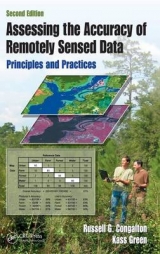
Assessing the Accuracy of Remotely Sensed Data
Lewis Publishers,U.S. (Verlag)
978-0-87371-986-5 (ISBN)
- Titel erscheint in neuer Auflage
- Artikel merken
Because the accuracy of remotely sensed data is critical to any successful mapping project, accuracy assessment is an important tool for anyone who uses remote sensing. This is a complete guide to assessing the accuracy of maps generated from remotely sensed data, and the only book available that is devoted solely to this complex topic.
Introduction
Why Accuracy Assessment?
Overview
Historical Review
Aerial Photography
Digital Assessments
Data Collection Considerations
Classification Scheme
Statistical Considerations
Data Distribution
Randomness
Spatial Autocorrelation
Sample Size
Sampling Scheme
Sample Unit
Reference Data Collection
Basic Collection Forms
Basic Analysis Techniques
Non-Site Specific Assessments
Site Specific Assessments
Area Estimation/Correction
Practicals
Impact of Sample Design on Cost
Recommendations for Collecting Reference Data
ASources of Variation in Reference Data
Photo Interpretation vs. Ground Visitation
Interpreter Variability
Observations vs. Measurements
What is Correct?
Labeling Map vs. Labeling the Reference Data
Qualitative vs. Quantitative Analysis
Local vs. Regional vs. Global Assessments
Advanced Topics
Beyond the Error Matrix
Modifying the Error Matrix
Fuzzy Set Theory
Measuring Variability
Complex Data Sets
Change Detection
Multi-Layer Assessments
California Hardwood Rangeland Monitoring Project Case Study
Balancing Statistical Validity with Practical Reality
Bibliography
| Erscheint lt. Verlag | 17.9.1998 |
|---|---|
| Zusatzinfo | 52 equations; 45 Tables, black and white |
| Verlagsort | London |
| Sprache | englisch |
| Maße | 156 x 235 mm |
| Gewicht | 295 g |
| Themenwelt | Naturwissenschaften ► Geowissenschaften ► Geografie / Kartografie |
| ISBN-10 | 0-87371-986-7 / 0873719867 |
| ISBN-13 | 978-0-87371-986-5 / 9780873719865 |
| Zustand | Neuware |
| Informationen gemäß Produktsicherheitsverordnung (GPSR) | |
| Haben Sie eine Frage zum Produkt? |
aus dem Bereich



